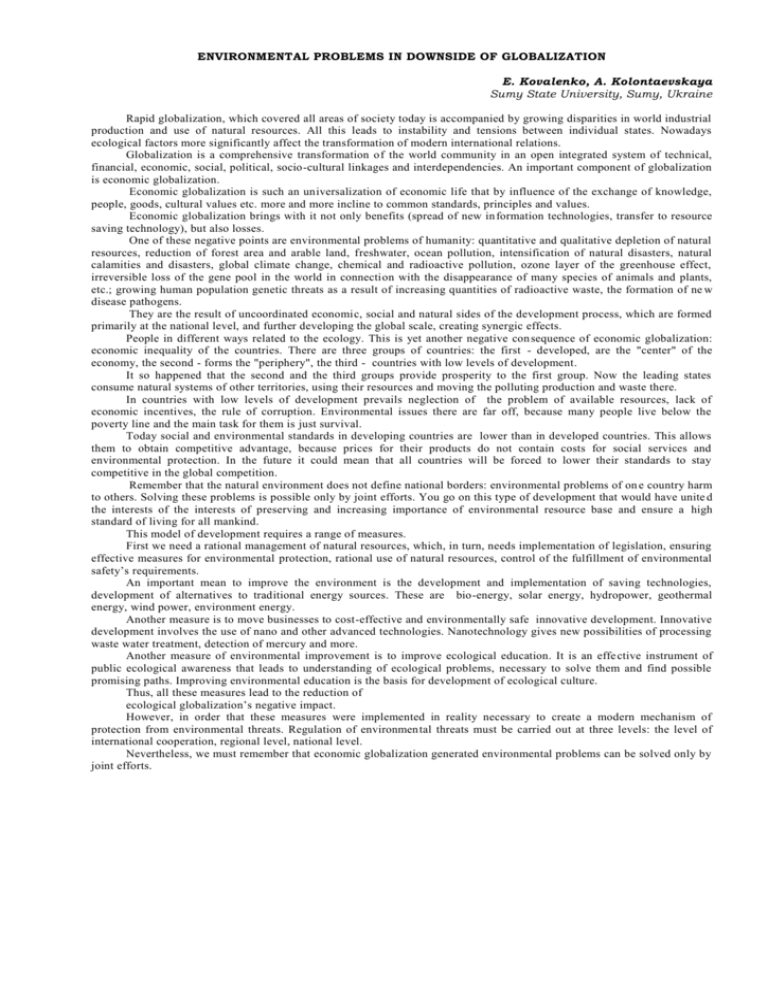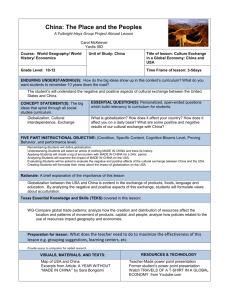environmental problems in downside of globalization
advertisement

ENVIRONMENTAL PROBLEMS IN DOWNSIDE OF GLOBALIZATION E. Kovalenko, A. Kolontaevskaya Sumy State University, Sumy, Ukraine Rapid globalization, which covered all areas of society today is accompanied by growing disparities in world industrial production and use of natural resources. All this leads to instability and tensions between individual states. Nowadays ecological factors more significantly affect the transformation of modern international relations. Globalization is a comprehensive transformation of the world community in an open integrated system of technical, financial, economic, social, political, socio-cultural linkages and interdependencies. An important component of globalization is economic globalization. Economic globalization is such an universalization of economic life that by influence of the exchange of knowledge, people, goods, cultural values etc. more and more incline to common standards, principles and values. Economic globalization brings with it not only benefits (spread of new in formation technologies, transfer to resource saving technology), but also losses. One of these negative points are environmental problems of humanity: quantitative and qualitative depletion of natural resources, reduction of forest area and arable land, freshwater, ocean pollution, intensification of natural disasters, natural calamities and disasters, global climate change, chemical and radioactive pollution, ozone layer of the greenhouse effect, irreversible loss of the gene pool in the world in connection with the disappearance of many species of animals and plants, etc.; growing human population genetic threats as a result of increasing quantities of radioactive waste, the formation of ne w disease pathogens. They are the result of uncoordinated economic, social and natural sides of the development process, which are formed primarily at the national level, and further developing the global scale, creating synergic effects. People in different ways related to the ecology. This is yet another negative con sequence of economic globalization: economic inequality of the countries. There are three groups of countries: the first - developed, are the "center" of the economy, the second - forms the "periphery", the third - countries with low levels of development. It so happened that the second and the third groups provide prosperity to the first group. Now the leading states consume natural systems of other territories, using their resources and moving the polluting production and waste there. In countries with low levels of development prevails neglection of the problem of available resources, lack of economic incentives, the rule of corruption. Environmental issues there are far off, because many people live below the poverty line and the main task for them is just survival. Today social and environmental standards in developing countries are lower than in developed countries. This allows them to obtain competitive advantage, because prices for their products do not contain costs for social services and environmental protection. In the future it could mean that all countries will be forced to lower their standards to stay competitive in the global competition. Remember that the natural environment does not define national borders: environmental problems of on e country harm to others. Solving these problems is possible only by joint efforts. You go on this type of development that would have unite d the interests of the interests of preserving and increasing importance of environmental resource base and ensure a high standard of living for all mankind. This model of development requires a range of measures. First we need a rational management of natural resources, which, in turn, needs implementation of legislation, ensuring effective measures for environmental protection, rational use of natural resources, control of the fulfillment of environmental safety’s requirements. An important mean to improve the environment is the development and implementation of saving technologies, development of alternatives to traditional energy sources. These are bio-energy, solar energy, hydropower, geothermal energy, wind power, environment energy. Another measure is to move businesses to cost-effective and environmentally safe innovative development. Innovative development involves the use of nano and other advanced technologies. Nanotechnology gives new possibilities of processing waste water treatment, detection of mercury and more. Another measure of environmental improvement is to improve ecological education. It is an effe ctive instrument of public ecological awareness that leads to understanding of ecological problems, necessary to solve them and find possible promising paths. Improving environmental education is the basis for development of ecological culture. Thus, all these measures lead to the reduction of ecological globalization’s negative impact. However, in order that these measures were implemented in reality necessary to create a modern mechanism of protection from environmental threats. Regulation of environmental threats must be carried out at three levels: the level of international cooperation, regional level, national level. Nevertheless, we must remember that economic globalization generated environmental problems can be solved only by joint efforts.







